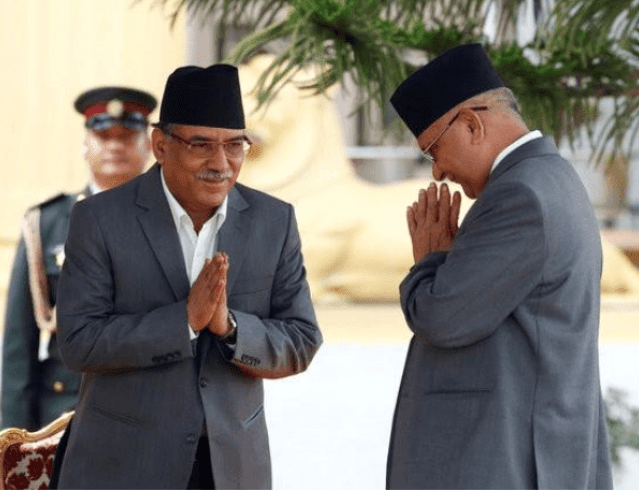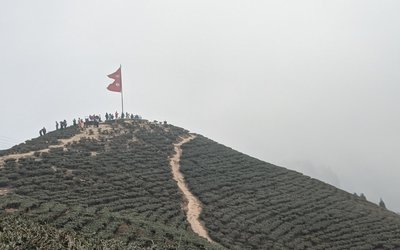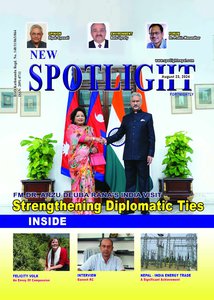
Deuba-led government and Yadav-led Election Commission (EC) need to be thanked for successfully organizing provincial and federal parliamentary polls on November 26 and December 7 in the midst of confusion and explosions. The EC stated a day after the polls that about 70 percent of eligible voters exercised their franchise in the second phase of elections held in 45 districts on December 7.Expectedly, UML won 80 parliamentary seats under the first-past-the-post system(FPTP), followed by Maoist Centre (36) and Nepali Congress bagged only 23 seats. The Federal Socialist Forum (FSF) and the RastriyaJanata Party (RJP-N) each won 11 seats. Four fringe parties also won one seat each. In the provincial election also UML remained at the top winning 168 seats under FPTP, leaving NC way behind with only 41 seats. Maoist Centre won a respectable 73, while FSF and RJP-N won 24 and 16 seats respectively. The results made public clearly showed that NC was in no position to form governments neither at the center nor in any of the 7 provinces. Nobody would like to rub salt to the left-inflicted political wounds of Deuba but at the same time one cannot help drawing his attention to the overall electoral thrashing and to the bitter fact that in the NC stronghold of far west only 1 seat out of 16 was won by the party. He may recall that in the first election after the rehabilitation of multi-partysystem in 1990, NC won all but 1 seat, which went to an independent candidate. The landslide victory (18 out of 19) in the region established Deuba as a national leader and helped him bag the powerful portfolio of home ministry in the government headed by G.P. Koirala. What caused this reversal over time, losing just 1 seat in 1990 to winning just 1 constituency in 2017, is a matter that needs to be delved into very seriously. To start with, Deuba has to stop the on-going intra- party trading of accusations and growing post-election factionalism within NC. He should not be seen as leading a faction because it is time for him to introspect and do whatever is called for to keep the party united and strong. One cannot be wrong in thinking that Deuba and other senior leaders like Shashanka Koirala owe NC supporters an explanation for the overall electoral debacle.
In the midst of disappointments, however, the results under the proportional representation system provided a ray of hope for NC to draw some solace from as it remained only one seat behind UML (41) and much above Maoist Center’s 17. Many analysts feel that the votes given to tree(NC) by voters under the proportional system both at the center and at the provincial level was the tribute to their great leaders such as late B.P. Koirala,Ganesh Man Singh and Krishna Prasad Bhattari. People’s verdict this time has also clearly shown that they may not always like the leadership and the way NC has been managed over time but there is no dearth of people who love this party and its basic principles propounded by the great sons of this nation. Hope for resurrection of NChas, therefore, not completely vanished.
Even NC’s well-wishers had begun to think since long that their party would not be able to retain the number one position that it had been on after the second election to the constituent assembly. Its silence on important issues such as religion, language, citizenship, etc. had begun to irritate its sympathizers who slowly started to lend their ears to what UML leaders opined on these issues. Even disagreeing with left leaders in somecases, people slowly began to find UML leaders’ analysis and observations worth paying attention to. Formation of the left alliance, consisting of UML and the Maoist Center, was the final blow to NC whose leadership was constantly accused of lacking ideas, vision and dynamism. Expectedly, it also failed to form a democratic alliance including Madhes-based parties such as FSF-N and RJP-N and ended up cooperating with newly divided and weakened two Rastriya Prajatantra Parties, which neither benefitted from this cooperation nor succeeded in providing meaningful help to NC.
Indeed, NC was agenda less and its lackluster campaign was no matchfor left front’s tireless collective efforts that promised to give a stable government and through it the much needed economic prosperity.NC had nothing concrete to offer in terms of promises to the people except to accuse the left parties that they were trying to establish authoritarian system in the country. Prime Minister Deuba was often heard telling people that they will not be able even to cry if the left front was voted to power, whichvoters found not only unbelievable but laughable. It is perplexing that Deuba, with serious oratory limitations, chose to be the sole notable campaigner in the election, ignoring many energetic intellectuals with well demonstrated oratory skills and power. It is also likely that many contenders had strong premonition of the electoral defeat, which could have kept many noted NC leaders confined within the territory of their constituencies. Whatever little NC did was far outweighed by the effective campaign of the left headed by leaders like Oli and Prachanda.Their campaign that concentrated on prosperity through stability worked well while NC failed to win voter’s trust. Deuba’s repeated shallow accusations that the left alliance meant authoritarian regime and people will have no freedom under them made voters feel that such accusations by him were merely aimed at instilling fear among people. A more or less agenda less NC under Deuba utterly failed to create an appeal among the voters. Election results were, therefore, as expected and not much inter-party trading of accusations is taking place. There was no reason; therefore, to think that problems would crop up to hinder timely formation of the central government by the victorious left alliance. Constitutionalproblems, however, did emerge to delay government formation.
Indeed, the dispute between NC and UML over the system for constituting the National Assembly (NA) delayed the authentication of the upper house election ordinance. The two major parties (NC andUML) traded serious accusations. While NC went to the extent of accusing the president of delaying the authentication of the ordinance at the behest of UML, the left party accused NC of trying to change the rules in the middle of the game to prolong its stay in power. It is said that NC included the provision of electing upper house members through a Single Transferable Voting (STV) system whereas the major parties had earlier decided to elect members through majority vote. It is clear that both parties on opposite side of the fence are interested in increasing their seats in the 59-member NA.If the NA election is held under the STV,NC may have as many as 8 representatives in the upper house but its number could fall to zero if the majority system is adopted in electing the members. Pressure kept on mounting from NC to authenticate the ordinance as forwarded by the government and not to do so was the urging of the left front, mainly UML, which emerged the largest political force in the recent parliamentary, provincial and local polls. President Bhandari did engage herself in lots of consultation with political parties and legal experts and repeatedly urged the parties to reach consensus because it was difficult for her to send back the ordinance forwarded by the government and it was also not easy for her to put the seal on it when the largest political force in the country was urging her not to do so. She took the much needed time and finally signed the bill into law some two months after it was sent to her. Following tradition and practices, the noncontroversial president took the decision which is not likely to offend UML either. The accusing NC wasted no time inprofusely thanking the head of statefor the job done as desired by the party.Despite this authentication, which many thought had cleared the way for immediate formation of the new government, the new dispensation is likely to take at least a month to be in place if everything goes as planned. It may be mentioned that prevailing laws have set the formation of the National Assembly as a prerequisite to starting the process of government formation. It is clear that the process of electing new government cannot commence without first constituting the federal parliament consisting of both the upper house and lower house. The left front may have no problem to wait for some more time to be at the helm of affairs but the front leaders are not likely to keep quiet if major decisions are made by the current government the leader of which has neither conceded defeat nor seems in a mood to refrain from making major decisions. Deuba and Oli (Pm and PM in waiting) will have to work in close cooperation in important matters such as appointment of state governors who will have to deal with Oli more than the outgoing Deuba. Oli, Deuba and Prachanda will have to act prudentially and avoid anything confrontational (act or utterances) that may lead to instability because people want a stable government to concentrate on our economic problems.
Without blaming any particular prime minister or finance minister, one can unhesitatingly observe that our economy has been ailing since long and some of the facts presented here should suffice to throw adequate light on its current very unsatisfactory state. A report recently released by the National Planning Commission (NPC) has shown that multidimensional poverty has halved in eight years. The survey of 12000 households which included variables such as education, health, drinking water and sanitation shows over 7.9 million people (28.6 percent of the total populations) are living in multidimensional poverty. This method is different from the conventional way of measuring poverty which uses income threshold of Rs.19262per person per year to gauge poverty. This technique estimates that 22 percent of the population is now living below the poverty level. While it would not be wise to talk much about these findings at the present juncture, one, however, gets worried looking at the deceleration in remittance inflow, which is said to have contributed to poverty reduction in Nepal. According to data made public, the inflow of remittance dropped by 1.4 percent in the first four months of the current fiscal year. Remittance inflow in these four months stood at Rs. 228.95 billion, while in the corresponding period of last fiscal year it was Rs.232.1 billion. Despite deceleration in remittance inflow for quite some time, it had not registered a negative growth as is the case now, which may cause shortage of foreign currency in days ahead to import different items ranging from food grains to heavy equipment. According to statistics made available, in the four months, Nepal imported food grains worth Rs.12.69 billion and the amount spent on vegetable and fruit import approximated Rs.7billion and Rs.4.91 billion respectively. Things that can be produced in this agricultural country are being imported in ever increasing quantities. Small wonder Nepal’s trade imbalance has swollen to Rs.308 billion in the four months of the current fiscal year. Equally disappointing is the fact that the ever increasing revenue collection has also begun to fall short of targets at a time when huge fiscal transfers will have to be made from the center to the seven provinces and local bodies. Prime Minister in waiting K. P. Oli is not likely to have an easy time when he replaces, Deuba, let us hope, in the next six weeks or so because he has the Herculean task of ensuring political stability and moving the nation towards the promised economic prosperity.

Dr. Tilak Rawal
Dr. Rawal is former governor of NRB.
- Prachanda Outsmarted
- Jul 19, 2024
- Prachanda Outsmarts Again
- Apr 14, 2024
- Prachanda Completes One Year
- Jan 26, 2024
- Terrible Times To Continue
- Oct 12, 2023
- Budgets Of Nepal
- Jun 09, 2023
















